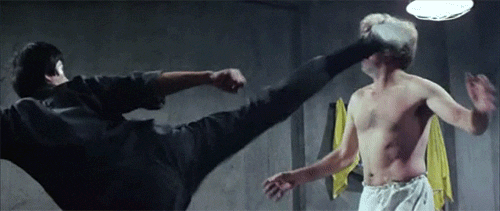
|

|
What is Jujitsu?
the political fighting style in which an opponent's energy and position is used against them with an emphasis on throwing out baseless claims in the press, immobilizing their funds and selectively applying the principles of balance (eliminating it), leverage (from back room deals), and momentum (from relentless lobbying) and as a last resort, putting important decisions on hold until the next session.
Judging by all of the legislation that congress has voted on in his favor, HSUS CEO Wayne Pacelle is a master of political jujitsu.
Jujitsu - meme gif

Jujitsu - video
Jujitsu - what is it?
When words are used to hurt or offend someone, much like jujitsu is used to physically harm.
verbal jujitsu
What does "Jujitsu" mean?
The use by a famous person of their fame, wealth and hotness to draw attention to a charitable cause.
Angelina Jolie is a master of Fame Jujitsu.
Jujitsu - what does it mean?
The ancient art of defensive trash talking. The ability to take the verbal assault someone directs towards yourself and project it back upon them. Much like that of an actual jujitsu attack, using your opponents wieght against them.
I wouldnt say that to him, he is highly skilled in the art of verbal jujitsu.
Jujitsu - meaning
When a company uses the tactics of its critics or competitors against them, in order to neutralize these opponents or to promote its own products or brand.
AT&T might shy away from a Friends & Family lookalike anyway. Why? Because it holds 62% of the residential market, and those customers are calling other AT&T customers about 62% of the time. Discounting those calls would mean a huge revenue hit. MCI, with its smaller residential share, can discount calls to other MCI customers without suffering such a big penalty. "This is what we call corporate jujitsu," says MCI's Price. "You look for your opponent's weakness and home in on it." Friends & Family may be earning MCI a black belt in marketing. -- Business Week, 1992.03.23.
Jujitsu - definition
-To persevere in spite of difficulty or injury.
-To take a beating and still remain conscious after a fight win or loose.
coined by Antonio Rodrigo Nogueira "Big Nog" in an ring side interview by Joe rogan when he said he would bring "good jujitsu" to the UFC
-A person who breaks his leg during a marathon and still finishes the race has "good jujitsu".
-A person who injures himself at work and still finishes his job has "good jujitsu".
Jujitsu - slang
i'm a black belt in jujitsu!" "sound sexual...
Jujitsu
The art of folding clothes with people still in them
Man with a back bent 90 degrees to the side: I need help
Me: *calls an ambulance
Me: this guy got jujitsu’d
Jujitsu
Jujitsu is a martial art which reflects the movements of the attacker back upon him or her. It has been practiced in Japan since the sixteenth century, although Jujitsu has its origins in Chinese martial arts. Jujitsu uses a series of joint locks, small weaponry, and defensive tactics in combination with conserved energy to neutralize an attacker. Many other martial arts such as Judo and Aikido have their roots in Jujitsu. The word “Jujitsu” means the practice of gentleness, and in addition to learning the moves associated with Jujitsu, students also make changes in their characters. Jujitsu is supposed to focus and calm the students, with the aim of making them better martial artists and more refined individuals as well. The movements of Jujitsu are efficient, flowing, and circular, and it is a distinctly beautiful martial art to watch. Jujitsu is also usually practiced within a very small circle, and many Jujitsu moves have been refined for close quarters fighting. Jujitsu reached its heyday during the Tokugawa Shogunate, when weapons were forbidden to most Japanese citizens. Jujitsu incorporates joint locking and arresting movements which are extremely useful in hand to hand combat where neither warrior has a weapon. When used correctly, it is also possible to disarm with a joint lock. Grappling, take downs, throws, and strangulation also play a role in Jujitsu.
Most schools of Jujitsu also teach techniques with canes, short swords, and use of ropes. Defensive techniques against modern weapons such as guns are taught as well, with a strong focus on neutralizing an opponent without harming him or her. Some students of Jujitsu also learn healing techniques including massage, while other schools also place a heavy value on the study of spiritual and philosophical concepts. Jujitsu is differentiated from other aggressive martial arts like Karate because it is not an offensive martial art, but a defensive one. Jujitsu students learn the arts of surrender, patience, yielding, and efficiency. Jujitsu is also highly effective, integrating fighting techniques for a variety of situations, with or without weapons. Jujitsu techniques are often taught in self defense classes for women, because it is possible to neutralize an attacker quickly and escape using Jujitsu techniques. In the twentieth century, Jujitsu was brought to the West by a variety of masters, and became a very popular martial art. In 1977, the Ju-Jitsu International Federation was formed, with the idea of organizing and regulating international Jujitsu competitions. In competition, the Federation recognizes two types of entries. The fighting system opposes single members from different teams who spar for points. In the duo system, two athletes from the same team demonstrate defensive techniques on the mat.
Jujitsu
-The peaceful art of folding clothes with people still in them
-involuntary yoga
Guy 01: “What did you do yesterday?”
Guy 02: “I did jujitsu on Simon”
Guy 01: “oh cool! Isn’t that where you fold clothes while the person is in them?”
Guy 02: “yeah, it was really fun. I wish Simon were still alive to tell you about all the fun we had!”
Guy 01: “what?”
Guy 02: “what?”